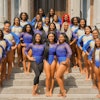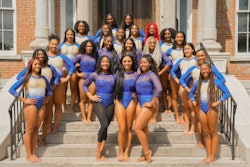Texas A&M, NCAA partnership recognizes universities that best champion diversity.
Texas A&M University’s Laboratory for Diversity in Sport and the NCAA have partnered to honor those athletic programs that are best championing diversity. A total of 162 Diversity in Athletics Awards are being given in eight categories, including overall excellence in diversity.
The NCAA granted Texas A&M’s lab $100,000 in January to evaluate the country’s college athletic departments on their diversity and diversity practices and award those who were the most outstanding. The 2008 overall excellence in diversity award recipients will be honored in June at the National Association of Collegiate Directors of Athletics (NACADA) convention in Dallas.
This is the third year the Laboratory for Diversity in Sport has given these awards. However, Dr. George Cunningham, who directs the lab, says the research has never been so thorough.
“We were able to be much more comprehensive this year because of the support of the NCAA,” says Cunningham, chair of Texas A&M’s Division of Sports Management in the Department of Health and Kinesiology. “I hope this will become a lasting partnership.”
According to Dr. Richard E. Lapchick, a renowned pioneer and activist for racial equality in sports, the NCAA’s support for these awards is a reflection of its current leadership agenda. “Myles Brand (NCAA president) has been a strong advocate of increasing diversity and inclusion since he became the president,” says Lapchick, director of the Institute for Diversity and Ethics in Sport at the University of Central Florida. “He’s put together a staff that looks more like America than it did five or 10 years ago. So it doesn’t surprise me that the NCAA would do this under his leadership because it has been consistent with the other initiatives that he’s put forth.”
Increasing diversity and inclusion also seems to yield more competitive athletic programs.
Many of the awardees — like Stanford University, The Ohio State University and University of Miami (Fla.) — also happen to be NCAA champions. “There is a close correlation with diversity success and academic success for student- athletes and finally championships,” says Charlotte Westerhaus, NCAA’s vice president for diversity and inclusion.
Cunningham sees the same correlation.
“We’ve been doing this a number of years, and we’ve always held that there’s a social responsibility, and I would even go as far to say it’s a moral responsibility — to have diversity in the workplace,” Cunningham says. “But, in addition, there is evidence that it is going to help your workplace in terms of creativity, ideas generated, and ultimately in terms of performance. And we are able to see that in a lot of these recipients.”
Not only were many of the awardees highly successful in other areas, but Westerhaus says she was happy to see that the class itself was so diverse.
“I think it’s exciting to see the diversity of the actual recipients of these awards from all types of institutions in all places around the country with all types of diverse student bodies,” Westerhaus says. “This should give an impetus for our NCAA institutions to say, ‘You know, there’s an institution that is just like me that did well in diversity excellence overall.’”
The following Division I colleges and universities were honored for Overall Excellence in Diversity: California State University, Long Beach; Drexel University; East Tennessee State University; Kansas State University; San Jose State University; Stanford University; The Ohio State University; University of Central Florida; University of Colorado, Boulder; University of Miami (Fla.); University of Texas at El Paso; and Wright State University.
Lapchick says it made him proud to hear that his home institution of UCF earned an overall excellence in diversity award.
“I tell [UCF athletic director] Keith [Tribble] that his staff looks more and more like America every time I see them,” says Lapchick, chair of UCF’s DeVos Sport Business Management Program. “He’s been deliberate about it. He’s been hiring the best people. He’s ensured that the interview process is wide open.”
The Overall Excellence in Diversity awards were also given to the following Division II colleges and universities: California State Polytechnic University, Pomona; California State University, Stanislaus; Florida Institute of Technology; Goldey-Beacom College; Indiana University of Pennsylvania; Lock Haven University of Pennsylvania; New York Institute of Technology; Oakland City University; Palm Beach Atlantic University; Queens College (N.Y.); Saint Leo University; Slippery Rock University of Pennsylvania; University of Alaska Anchorage; and University of New Haven.
Queens College stood out amongst its Division II award-winning peers, Cunningham says.
“It is an anomaly in that it did well in practically all of the categories,” he says. “All of the overall winners did well in all of the categories, but Queens College did extremely well in all of them.”
Texas A&M University’s Laboratory for Diversity in Sport studies issues related to diversity in college sports teams and athletics departments. To evaluate the NCAA’s member colleges and departments for the diversity awards, the lab gathered archival data and distributed 1,930 questionnaires to the top athletic administrators in each department. Lab researchers will next be interviewing officials from the winning institutions in the coming months to produce a report that highlights successful diversity practices. The Division I report will be disseminated to all NCAA member institutions this fall, while the reports for Division II and III will be submitted in the next two years in succession.
“The reports will serve somewhat as the best practices for diversity,” Cunningham says. “And really give people who aren’t on the list of awardees and want to improve the guidance on how to do so.”
Click here to post and read comments
© Copyright 2005 by DiverseEducation.com



















